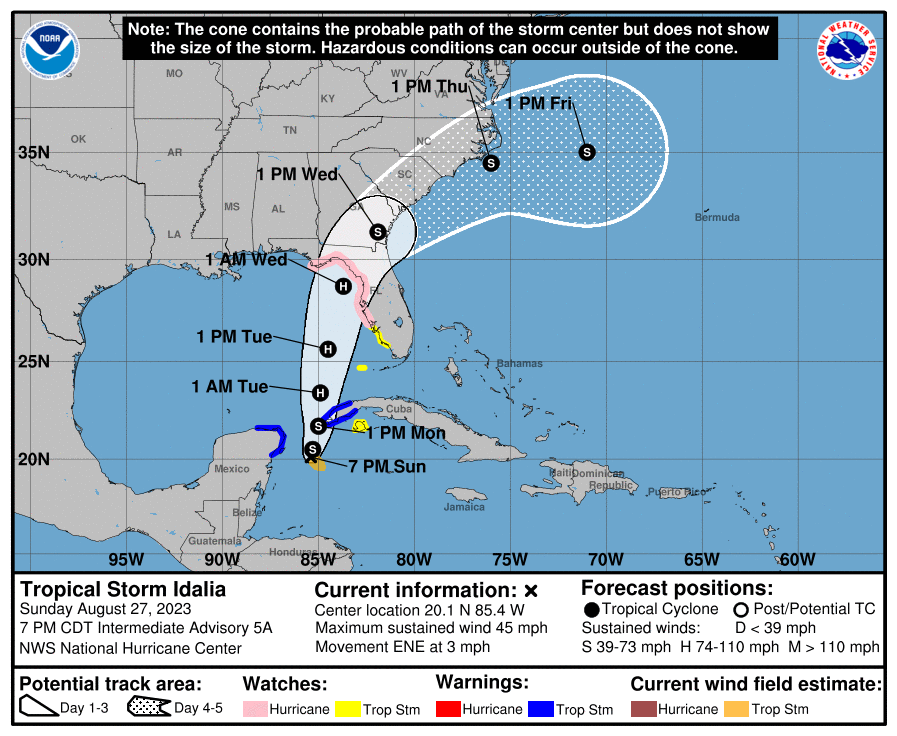
Introduction: Hurricane Idalia is on the horizon, and with its potential for destructive winds, heavy rainfall, and flooding, it’s crucial to be well-prepared. The key to minimizing risks and ensuring the safety of yourself and your loved ones is thorough preparation. In this guide, we’ll walk you through the essential steps to take before, during, and after Hurricane Idalia to keep you and your community safe.
Before the Hurricane:
- Stay Informed: Monitor reliable weather sources, such as the National Hurricane Center, local news channels, and official government websites. Stay updated on Idalia’s track, intensity, and projected impact on your area.
- Don’t get a false sense of security: Remember, Projected landfall is just a projection. Accurate path will not be known till shortly before landfall.
- Create an Emergency Plan: Develop a comprehensive family emergency plan that includes evacuation routes, meeting points, and contact information. Ensure all family members are familiar with the plan and practice drills.
- Assemble an Emergency Kit: Your emergency kit should include essential supplies like non-perishable food, water, first aid supplies, prescription medications, flashlights, batteries, a multi-tool, personal hygiene items, and important documents stored in waterproof containers.
- Charge Your Devices: Cellphones, Laptops, Battery packs. Power loss is quite common during a hurricane and it can take time till power is back up and running.
- Secure Your Property: Trim trees and shrubs, clear gutters, and secure outdoor objects that could become projectiles in high winds. Board up windows and reinforce doors if necessary.
- Upload Important Documents to the Cloud: This includes copies of ID, Insurance information, and photos / videos of your house before the storm.
- Evacuation Plans: If you live in an area prone to flooding or storm surge, know the evacuation routes and shelters designated by local authorities. If you are advised to evacuate, do so promptly. Take with you proof of residency, as you may need proof of residency to return after the storm.
During the Hurricane:
- Stay Indoors: Once the storm begins, stay indoors away from windows and glass doors. Avoid using candles and instead opt for flashlights to prevent fires.
- Stay Connected: Keep a battery-powered or hand-crank emergency radio to stay informed about the latest updates and instructions from local authorities.
- Monitor Alerts: Follow official alerts and announcements from local emergency management agencies. Be prepared to take action based on their guidance.
- Avoid Floodwaters: Stay away from flooded areas, both on foot and in vehicles. Just a few inches of fast-moving water can carry away a vehicle, and flooded areas may contain hidden hazards.
After the Hurricane:
- Remain Cautious: The danger isn’t over when the hurricane passes. Be cautious of downed power lines, weakened structures, and standing water.
- Check on Loved Ones: Contact family, friends, and neighbors to ensure their safety. Assist those who may need help, such as the elderly or disabled.
- Assess Damage: Inspect your property for damage but do so safely. If you suspect any gas leaks or structural damage, evacuate and contact the appropriate authorities.
- Contact a Public Adjuster: Public Adjusters are trained in properly documenting your claim, and handling it in a way that will get you the payment you deserve. To protect your claim, your first step should be contacting Panther Public Adjuster for a free consultation. We will also be the first to tell you if the damages don’t warrant filing a claim, rather then calling your carrier, filing a claim, finding out it is below your deductible, and needlessly having a claim on your record.
- Stay Patient: Recovery takes time. Be patient as your community works to restore power, clear roads, and provide assistance to those in need.
Conclusion: Preparing for Hurricane Idalia involves a combination of staying informed, planning ahead, and taking timely actions. By following this comprehensive guide, you’ll be better equipped to safeguard yourself, your loved ones, and your property during the storm and its aftermath. Remember, your safety is paramount, so never hesitate to prioritize it above all else.
